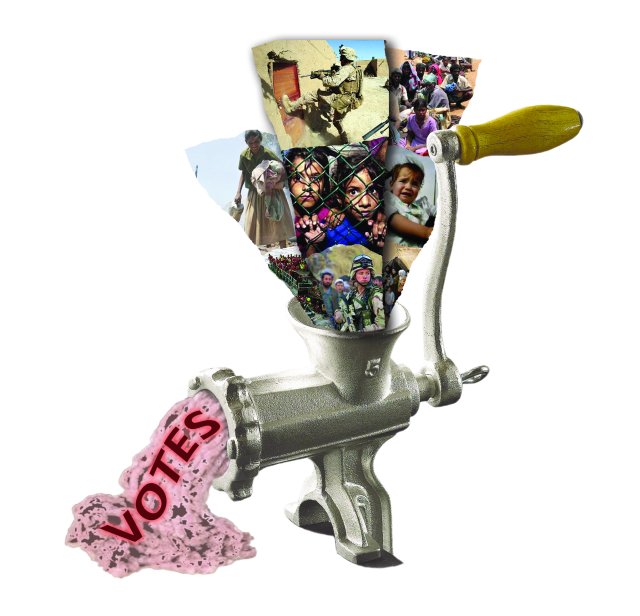
Within a week of the government-appointed Houston panel’s recommendation that Australia return to the “Pacific solution” for asylum seekers, the toxic atmosphere of John Howard's “children overboard” era resurged powerfully in Australian politics.
On the same day the Houston report recommended indefinite refugee detention on Nauru and Manus Island for all asylum seekers arriving by boat, 67 asylum seekers taken aboard the Singapore-bound MV Parsifal were the subject of a tense stand-off at sea.
Rescued off the coast of Java, the group reportedly grew panicked when the ship planned to continue on to Singapore. The ship's master feared they were going to hurt themselves if he did not take them to Christmas Island. But when home affairs minister Jason Clare recounted the rescue to Australian media, he said the asylum seekers had “been very aggressive” to the crew.
Opposition leader Tony Abbott and his immigration spokesperson Scott Morrison responded immediately, labelling the event a “dire” act of “piracy” and “a reverse Tampa”.
Echoing John Howard's hasty and false accusation that refugees aboard an asylum boat in 2001 had thrown children overboard — when in fact they were drowning and begging for help — Abbott said the MV Parsifal “should have been met on Christmas Island by the Australian Federal Police rather than immigration officials”.
“John Howard met the Tampa with the SAS.”
The shipping line issued a statement saying there was “no physical aggression” from the asylum seekers, only possible self-harm, but Abbott maintained that “if you want John Howard results, you've got to have John Howard resolve”.
The asylum seekers arrived at Christmas Island on August 14. Two days later, the lower house and the Senate had carried laws to legalise offshore processing and send all asylum seekers that arrived by boat after August 13 — the day the Houston report came out — to detention camps on the small Pacific islands.
Immigration minister Chris Bowen championed Labor's total surrender to the “Pacific solution”, saying: “From this point forward, anybody who comes to Australia by boat should be very clear about the possibility of not being processed and resettled in Australia.”
A tumult of racist rhetoric drove the parliament “debate”. Liberal backbencher Dennis Jensen said it was time “for the iron fist” and Senate opposition leader Eric Abetz said “the boat people will need to join the queues and wait in line”.
Opposition leader Tony Abbott dropped the word “illegals” to describe asylum seekers as often as possible and demanded Labor adopt the “full Howard package”, including reintroducing temporary protection visas and turning boats around at sea.
Labor's so-called left MPs shamelessly joined the right faction and the Coalition in vilifying refugees and lampooning the Greens. Senator Doug Cameron cited “the political immaturity and intransigence of the Greens” to justify his support for the move.
In the lower house only Greens MP Adam Bandt and independent MP Andrew Wilkie opposed the laws. Labor, Coalition and the other independents sat together on one side of the chamber, even voting down an amendment by Bandt to limit detention on Nauru and Manus to one year.
Rather, the laws will allow indefinite detention because refugees would be given “no advantage” over those awaiting resettlement through the United Nations. Gillard said the possibility they could be held for up to five years was “correct”.
Defence personnel were sent to Nauru and Manus Island on August 17 to initiate makeshift plans to send people over by the end of the month. Reports that first arrivals will be housed in tents came as many critics of the Pacific solution voiced outrage over the return to Howard’s “dark days”.
Author of The Pacific Solution Susan Metcalfe said in an August 16 Sydney Morning Herald article: “It is well known that the Pacific Solution caused enormous suffering to vulnerable human beings, some of whom are still recovering. But the policy also entrenched the notion that causing harm is acceptable practice when political problems need solving.”
Under Howard's offshore detention regime, then-Queensland Democrat Senator Andrew Bartlett was the only politician to independently visit the asylum seekers on Nauru.
He said detention on remote islands “compounds human suffering”, and Nauru could not provide the support that traumatised and desperate people needed. Today, locals use Howard's abandoned detention facilities on Nauru for housing and a primary school.
Media and refugee advocates rarely made the 4000-kilometre trip to the island, where hunger strikes, severe self-harm and at least one death unravelled over the seven years it operated.
Bartlett said in 2007 the government had refused to allow the Australian Human Rights Commission and two parliamentary committees to visit the detention camp, to prevent scrutiny and oversight. This is being repeated again it seems, as Labor refused to support an independent assessment of detention on Nauru.
The Edmund Rice Centre has reported on children and adults deported from Nauru and later abducted, tortured and killed in Afghanistan.
The last asylum seeker on Manus Island, Aladdin Sisalem, who was left there alone for 10 months under the guard of local soldiers, said he endured emotional and physical torture. “I am now, formally, mentally disabled,” he told the ABC on August 14.
“I have permanent post-traumatic stress and anxiety. They took from my health to give me safety, but they didn't really give me safety, they left me without protection. 'What do you think will happen there away from people’s eyes? Why do you think journalists are not allowed in there?'
“When you are there, you are worth nothing. You are not protected by law.”
Comments
Anonymous replied on Permalink